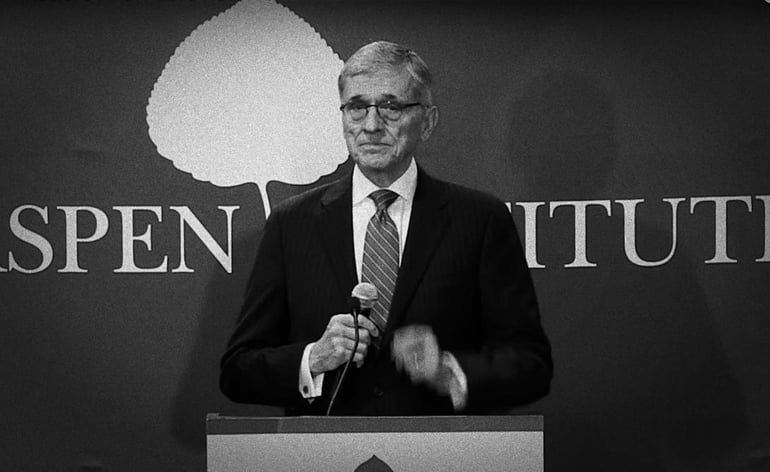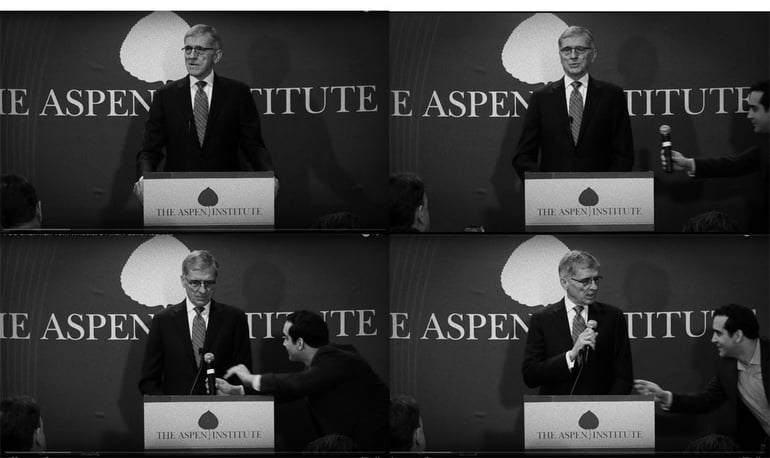
Below, is the transcript of the final public address of former FCC Chairman Tom Wheeler.
It was delivered Friday, January 13th, at the Aspen Institute, a bi-partisan think tank where he is now a Senior Fellow—a post held by five Chairmen before him, including two Republicans.
Wheeler resigned one week later.
I have read nearly every public word he has written, and watched most Open Meetings held each month. From these and other contextual materials I've assembled a personal opinion, which is favorable of the man—though dust may settle.
You are entitled to yours.
The duties of the role of a public servant: to stimulate or stabilize changes not for themselves but the public interest, and therefore drawing and/or crossing as necessary a line between making peace between competing interests and exercising the power of law to uphold the health and happiness of the people they represent. In this role, Wheeler was effective. As was his final speech.
The speech is of a particular type: a farewell.
Farewells of public officials seem to resonate with more poignancy than the words of welcome speeches given years before at the commencement of Office.
Whether farewells impart qualities of goodness and satisfaction or resentment and vindication upon an audience obviously depend on the perspectives of listeners.
But I find most goodbyes give more echo regardless of flavor. More reverberation. Perhaps because they are sustained by a concrete history of real accomplishments, versus unrealized promises toward unknown futures.
Where words of a public and powerful official once filled and sometimes silenced busy rooms, the absence of a familiar voice of leadership is sudden and disarming.
Final words float like no other words. Disembodied, but real, fading into the noise of history.
Wheeler's speech echoed for a long time. It was the farewell of someone dedicated to his work for the greater good. It was the farewell of a strong but emotional human being. It was the farewell of a true Chairman (or Chairwoman, there's been one) because of its humility, realism, and deft articulation of the logic behind policies he led—with emphasis on the critical importance of an open Internet— while offering gestures of deference to those who stood behind him, and olive branches to those who stood in front.
Though he gave it willingly, Wheeler has no need for humility:
In both quantity of initiatives begun and laws passed or altered, and the fearless scope of agendas, Tom Wheeler is the most effective U.S. communications policymaker in living memory.
In a subsequent post I will provide evidence to substantiate this claim (along with other updates about the "new FCC"), which is essentially fact to those who follow the behavior and authority of the FCC with a close eye. He has been lost in the clamor of mass media, where microphones now glow white hot with captured speech.
Speaking of microphones, the first several minutes of audio in the recording of Wheeler's farewell are dead air.
Someone forgot to patch the podium mic into the live stream feed, or whatever.
Mouthing words and gesturing in silence with the kinetic language of an experienced statesman, the Chairman forges on, tunnel-visioned into thought, as an unlucky man creeps slowly over from the wings with another microphone—a wireless microphone—and notices neither mic nor man till both hover underneath his chin for several seconds.

In the final screenshot of this collage, Wheeler quips with the man as the audience laughs:
"So, you actually need to hear me? Is that the whole concept?"
Yes Mr. Chairman, it is.
~ ~ ~ ~ ~
http://transition.fcc.gov/Daily/Releases/Daily/Business/2017/db0113/DOC-343026A1.pdf
Prepared Remarks of FCC Chairman Tom Wheeler
“A Time to Look Forward: Protecting What Americans Now Enjoy”
The Aspen Institute
January 13, 2017
What a privilege I’ve had for three years, two months, and 16 days! This has been an exciting time to be chairman of the FCC as digital technology reshaped our world.
Right here at the top I want to recognize what I know everyone understands – that the team that I was fortunate to work with is the best team that has ever been assembled at the Federal Communications Commission. I may be the guy who delivers the speeches, but this was their effort and their success. I will always be grateful to this dedicated team.
Throughout my tenure, you’ve heard me talk about how we are living through an historic network revolution whose power to transform our economy and daily lives is unprecedented. The FCC is the public’s representative in this network revolution. We have the responsibility of assuring that innovation and technology advance, while at the same time preserving the basic covenant between networks and those whom they connect.
During these past three years, we have moved through a key stage of the IP revolution. While the nature of how information is delivered has changed - from analog to digital - the basic responsibilities network owners have to network users have not. We called this the Network Compact and its five components - access, interconnection, public safety, consumer protection and national security - were at the core of our major activities.
To reflect changes in technology, we modernized telephone-era programs for the Internet age. The new Connect America Fund is supporting wired and wireless broadband deployment to millions of previously unserved rural Americans. A revitalized E-rate is delivering the bandwidth and Wi-Fi needed to support digital learning tools. Our revamped Lifeline is helping low-income Americans afford broadband, while rooting out waste, fraud, and abuse. We also made sure that new technology was applied to help address the challenges of individuals with disabilities.
We’ve taken a series of world-leading actions to repurpose spectrum for broadband and meet the exploding demand for wireless connectivity. Our AWS-3 auction made 65 MHz available for broadband, while netting a record $41 billion for the Treasury. Our Spectrum Frontiers Order made the U.S. the first country in the world to open up high-band spectrum for 5G networks and applications. And we are nearing completion of the world’s first incentive auction.
To preserve competition in key markets, we discouraged the Comcast/Time Warner Cable and Sprint/T-Mobile deals. At the same time, we approved, with appropriate safeguards, the Charter/Time Warner Cable/BrightHouse and AT&T/DirectTV mergers, which will give Americans more competitive options for high-speed broadband, while spurring fiber deployment to over 12 million locations.
As the agency responsible for America’s networks, we made cybersecurity a primary mission of the Commission.
We adopted privacy protections that give consumers control over how their ISPs use and share their personal data.
And, of course, we adopted strong net neutrality rules to preserve the open Internet as a platform for free expression and innovation.
The basic concepts we were dealing with weren't new.
The idea of an open network goes back as far as the "first-come-first-served" traffic management of the telegraph. Telephone networks' common carrier status was an extension of this concept warranted by a behavioral legacy and a demonstrated exercise of monopoly power. And, let’s not forget, it was the open telephone network that delivered the early Internet and allowed America to get online. America’s communications history is one of open networks.
In a similar vein, the idea of the privacy of information as it moves over a network is not revolutionary. For decades, telephone users knew that FCC rules protected their information - not just the contents of a call, but the information transmitted to setup that call. Yet, thanks to the new technology, we found ourselves in the strange situation where the privacy protections for a smartphone's voice call didn't extend to the use of the same device and the same network for accessing the Net.
Finally, networks have always been attack vectors. During the Civil War, Union troops would take up the planks on Chain Bridge every night for fear John Mosby's Confederate rangers would use the road network to steal into the capital. We can't pull up the planks on the Internet, but we can, must - and have - taken collective actions to protect our network security.
My service on the President’s Intelligence Advisory Board prior to joining the FCC alerted me to the ever growing importance of protecting our critical network infrastructure from cyber intrusions of all kinds. And it led to my determination to make cyber matters a leading priority at the FCC.
While our policy agenda was certainly aggressive and ambitious, the fact is we were largely dealing with the same core issues that have long faced regulators.
It now falls to the new FCC - and to those who advocate before it and the Congress - to determine the road they want to take from here.
We are at a fork in that road. One path leads forward. The other leads back to re-litigating solutions that are demonstrably working. Looking forward is an era of ISPs operating responsibly at both the edge and the core network under light touch regulation accompanied by a referee on the field to throw the flag when necessary. Looking backward takes away existing protections and throws into question ISP expansion into edge activities.
All the press reports seem to indicate that the new Commission will choose an ideologically-based course.
Allow me to make the case for choosing the fork in the road that continues moving things forward.
First, I believe in the value of history; and the historical facts are clear. Those who build and operate networks have both the incentive and the ability to use the power of the network to benefit themselves even if doing so harms their own customers and the greater public interest. This is not casting aspersions at network operators, it is simply stating an historical fact that reflects basic human nature. It is no different than the human impulse that prompted the imposition of speed limits.
The question going forward is whether the ISPs and policy makers will recognize that obeying speed limits helps everyone?
The second point in favor of staying the course is that it certainly appears to be working.
The overarching goal of the new policies was to promote a thriving broadband ecosystem, and that’s exactly what has happened.
In the year after the Open Internet rules were adopted, venture investment in Internet-specific businesses was up 35 percent. Open markets invite innovation.
Investment has been strong not just at the edge, but in the core of our networks.
Yesterday, the CEO of AT&T reportedly told the President-elect that his company had been the country’s leading investor of capital for each of the last five years. This, of course, includes the two years since adoption of the Open Internet rules. A recent report pegged overall network investment at $76 billion for 2015, which is an increase from the year I arrived at the Commission.
Putting that investment in perspective is also important. Network construction efficiencies are going up and thus costs are going down as networks get more bang for the buck. As AT&T’s President of Network Operations said this summer, “In 2015/16, we’re going to deploy about 250% of the capacity that we did in 2013/14, and we’re going to do it for 75% of the cost.”
And this investment makes sense. Innovative new products and services have the effect of driving up usage of the Internet. With this increased usage, ISP revenue is up from a year ago. An open Internet drives revenue increases for networks, thus creating the incentive to invest.
Network operators also have new opportunities to become edge service providers. During my tenure, we approved AT&T’s becoming the country’s largest video provider, and Verizon acquired AOL. Critical to that expansion is the assurance of network openness, and the protection of privacy and security so as to not abuse the extreme power that network ownership naturally brings with it. By providing those assurances, our rules actually facilitate network operators’ expansion into edge services.
The most compelling reason to keep moving forward on our current course with broadband policy is this: the open Internet is the law of the land. Tampering with the rules means taking away protections consumers and the online world enjoy today. What some describe as “free market economics” cannot mean simply freeing incumbents of their responsibilities. A hands-off approach to network oversight is more than a shift in direction, it is a decision to remove rights and move backward.
In this regard – and in so much that has occurred since the election – I have taken refuge in Abraham Lincoln’s words in his First Inaugural. “While the people retain their virtue, and vigilance, no administration … can very seriously injure the government, in the short space of four years.”
The reassurances of the second part of that statement are predicated on the first part, the requirement that the people “retain their virtue and vigilance.”
Yes, we must be vigilant. And the first step in such vigilance is to ask those who want to rush to take away existing protections a simple question: where’s the fire? What has happened since the Open Internet rules were adopted to justify uprooting the policy? As I said a moment ago, network investment is up, investment in innovative services is up, and ISPs revenues – and stock prices - are at record levels. So, where’s the fire? Other than the desires of a few ISPs to be free of meaningful oversight, why the sudden rush to undo something that is demonstrably working?
Vigilance requires the FCC or the Congress make the case as to why the American tradition of open networks should be reversed. Fortunately, the rules under which the FCC must operate provides for just such vigilance. Contrary to what you might have heard, reversing the Open Internet rules is not a slam dunk. The effort to undo an open Internet will face the high hurdle, imposed by the Administrative Procedure Act, of a fact-based showing that so much has changed in just two short years that a reversal is justified.
Let’s remember that the Open Internet decision came after ten years that saw vast changes in the technology of the Internet, as well as in the services it enables. In short, a lot happened leading up to the 2015 decision – it is hard to make a case that the past two years come even close to that revolutionary period.
The recent D.C. Circuit decision was a strong and resounding affirmation of the FCC’s authority as well as the soundness of its decision based on the record. If there is a reversal of the Open Internet rule, it will have a high hurdle to vault to prove to the same court why its 2016 decision was wrong.
It is quite possible that Congress will be the focus of efforts to take away open networks. Congress, of course, does not bear the burden administrative procedure imposes to justify its decision. It also has the ability to completely redefine just what constitutes net neutrality. It might be worthwhile, therefore, to define the key concepts behind net neutrality that truly preserve a fast, fair, and open Internet.
It’s a matter of Truth in Packaging. If something is deserving of being called net neutrality, it must be Comprehensive, Continuing and Consistent:
-
Comprehensive: Limiting the definition of Net Neutrality to blocking, throttling and paid prioritization is an empty promise if it is not accompanied by the authority to comprehensively protect against the power of broadband gatekeepers, not just some of their conduct.
-
Continuing: We do not know how the Internet will evolve and ISPs will take advantage of new technology. A general conduct rule – which I've analogized to a referee on the field with the ability to throw a flag – captures conduct whether is it new or old, blatant or nuanced with ongoing regulatory oversight and the ability to act where necessary to prevent anti-consumer and anti-competitive practices.
-
Consistent: By this, I mean a consistent standard so that everyone - whether an ISP, a consumer, or an edge provider - knows the yardstick that will measure fairness. Since the time of the Interstate Commerce Act in 1887 there has been a consistent standard for judging carriers’ practices: are those practices just, reasonable, and not unreasonably discriminatory? These concepts have 130 years of jurisprudence behind them, and they have evolved to effectively address the incentives that network operators may otherwise have to exploit their position to the detriment of consumers or competition.
Passing legislation or adopting regulations without these key provisions and calling it net neutrality would be false advertising.
And when it comes to action by the FCC, it is important to recall that the D.C. Circuit found that the limited rules the ISPs say they’ll accept – blocking, throttling, and no paid prioritization - have their statutory justification in Title II. Thus, removing Title II also removes these fundamental protections.
The ability of consumers and businesses to connect to and use open broadband networks is essential to the 21st century economy. The delivery of the products and services that will define our future requires gatekeeper-free access to networks.
Here is what we know about that future: everything will connect and send signals. It will be radically different from how we understand the Internet today. The amazing changes brought thus far by the Internet have fit in two categories: finding information and transmitting video. It has been a force of change, but not yet revolutionary.
The revolution comes with the next step of the Internet, harnessing that connectivity to productive activities. I’ve seen machine-learning artificial intelligence build an aircraft wing at Boeing. I’ve seen augmented reality assist and improve human activities at Microsoft. I’ve seen virtual reality transform information consumption at Facebook. I’ve ridden in autonomous cars at both The Ohio State University and the University of Michigan.
What is significant about these – and so many other next-generation applications – is they don’t happen without network connectivity. They all have developed on the assumption that connectivity will be fast, fair and open – and today that assumption is guaranteed by the Comprehensive, Continuing and Consistent protection of the Open Internet rule. To take those protections away at the request of a handful of ISPs threatens any innovation that requires connectedness and with it the productivity gains, job creation, and international competitiveness required for American economic growth.
Similarly, as everything goes into the cloud, the ability to access the cloud free of gatekeepers is essential. If ISPs get to choose which applications and clouds work better than others in terms of access speed and latency, then they will control the future.
We have already seen how AT&T and Verizon have favored their own video services by zero-rating their product while forcing consumers to pay data charges for competitors. Just take that behavior and look how it would affect other 21st century services.
Whether it’s Amazon Web Services, or Microsoft’s Azure, or Salesforce.com’s integrated cloud-based activities, ISPs free from open access obligations and behavioral oversight can choke growth and innovation, or, at the least, demand tribute for passing over their network.
The growth of the Internet of Things is another area that depends on the open connectivity of those things. If ISPs can decide arbitrarily which IoT devices can be connected, or favor their IoT activity over that of competitors, the bright future dims.
No company using the Internet is safe absent the kind of common carrier requirements America has historically expected of its networks. Even broadcasters’ new ATSC 3.0 depends on open networks. Because it is a one-way capability, ATSC 3.0 requires a return path. Competitors to broadcasters control that pathway. Absent open access, the success of ATSC 3.0 could be in the hands of those whose video interests are quite different from those of broadcasters.
Overturning the Open Internet rule would also jeopardize the legal underpinnings of the broadband privacy rules, and indeed Republicans have targeted the recent privacy order for repeal. But in today’s interconnected world, the absence of FCC regulation does not necessarily mean there is no regulation. Rather, it simply creates a vacuum that will be filled by other rule-makers in other countries.
In the absence of FCC privacy rules - and with the recent court case raising serious questions about the FTC’s authority to impose privacy requirements on the non-common carrier businesses of common carriers – US carriers could find could find themselves unable to qualify for the Commerce Department’s Privacy Shield Framework for their ISP businesses. The result would be the regulation of American businesses under the privacy rules of the European Union.
But if you really need proof the Open Internet rule is working, look at how it is being used by its
opponents when they operate as edge providers.
When AT&T – in its role as an edge video provider – is assured access to the broadband networks of Comcast and Charter for its competitive cable-like DirecTV NOW service, it is proof that the Open Internet rule is working. One only has to remember the interconnection and porting debates that hindered the access of over-the-top (OTT) video providers pre-Open-Internet-rule to appreciate the importance of an open Internet to everyone – even its opponents.
What is most interesting about this example is that the porting and interconnection problems that existed pre-rule have been eliminated without heavy-handed regulation. The mere fact that the FCC declared interconnection a Title II activity under the rules – but chose not to regulate - has produced an upswing in interconnection agreements and a downturn in interconnection pricing.
This is a significant development because it shows how the Open Internet order is successful simply by being watchful. There has been no ex ante rate regulation. The simple fact that the FCC was the referee on the field ready to act if necessary has meant the game has been played fairly.
Access to the network is what the new economy is built on, and it must not be taken away. The vigilance Lincoln spoke of means we must be alert to name-only, so-called Net Neutrality policies that actually retreat from the protections that exist today.
The open Internet is the most powerful engine for innovation, economic growth and job creation in the world today. The opportunities before us are limitless. As we choose our path forward, we need to remember how we got here. We got here with smart government, not absent government. We got here with a government that was pro-competition, not pro-incumbent. We got here thanks to policies rooted in reality, not ideology. Most important, we got here because of the genius of America’s inventors and entrepreneurs and an open platform that allowed them to execute their ideas without having to ask for permission.
Together, we’ve made so much progress. The activities of the last three-plus years – from E-Rate, to Lifeline, to rural broadband; from spectrum availability to 5G; from cyber protection to privacy and an open Internet – are the law of the land. We must not forget that the proposals being floated to change what has been done would take away benefits Americans now enjoy.
It is time to keep moving forward. This is not the time to retreat and take things away.
Vigilance to protect that which Americans now enjoy must be our watchword.
Finally, let me close with a personal observation. Serving as Chairman of the FCC has been the greatest professional honor of my life. I am grateful to President Obama for his confidence in nominating me and, again, to the incredible and dedicated staff of the FCC who honored me by allowing me to say I was their colleague.
And to my wife Carol. You remain the wisest and most loving person I have ever known - attributes that were tested by your husband over the last three years as he brought the tensions of the FCC into your home, but you never wavered. I love you, and I thank you for being both supportive and challenging.
Ladies and gentlemen, thank you.
Alex Milne
Alex Milne was Product Marketing Manager and Digital Marketing Manager for RF Venue, and a writer for the RF Venue Blog, from 2014-2017. He is founder and CEO of Terraband, Inc., a networking and ICT infrastructure company based in Brooklyn, NY., and blogs on spectrum management, and other topics where technology,...
More from the blog

FCC Continues Discussion on UHF White Space for Wireless Mics

Cross-Industry Coalition Brings Incentive Auction Rulemaking to Screeching Halt Over Concerns About the Duplex Gap

A New Chapter Opens for the RF Venue Blog
Subscribe to email updates
Stay up-to-date on what's happening at this blog and get additional content about the benefits of subscribing.

